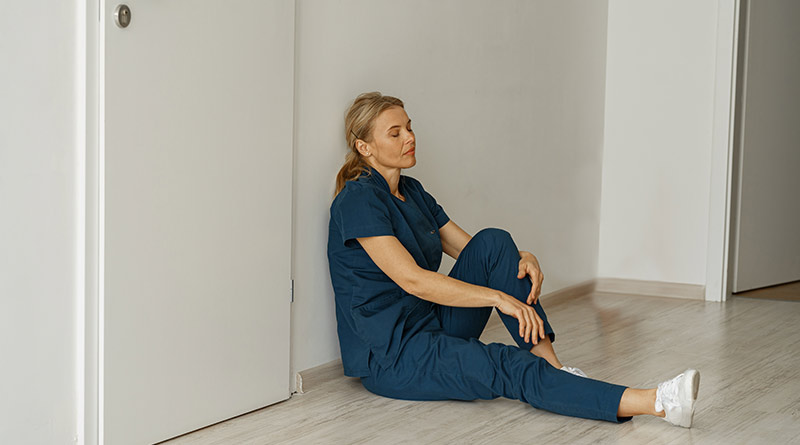
Care Staff Falling Ill as Understaffing Takes Its Toll
Hospitals and care homes in the UK are so short-staffed that nursing staff are continuing to work while unwell, with stress the leading cause of illness hitting an eight-year high, new research has revealed.
It comes as the Royal College of Nursing (RCN) separately reveals it is receiving dozens of calls a week to its advice line from burnt out staff seeking help over understaffing and spiralling pressures at work and is set to receive its highest number of calls since 2022.
The landmark survey by the College, of more than 20,000 UK nursing staff about their employment conditions, paints a stark picture of the reality of modern nursing in our NHS and care system with nursing staff being made stressed and sick as a result of the pressure they are under.
The survey found that two thirds (66%) admit to working when they should be on sick leave multiple times a year, up from fewer than half (49%) in 2017. Stress is the biggest cause of illness given by staff in the survey (65.1%), up from 50% in 2017. The numbers reporting working whilst sick and citing stress as the leading cause both hit eight-year highs.
Meanwhile, seven in ten (70.4%) are working in excess of their contracted hours at least once a week, around half (52.1%) of whom do so unpaid.
The survey reveals unsustainable pressures on staff that are being felt across the UK and in all settings. An NHS nurse in an older peoples’ ward in England said staff “go home sick with anxiety” when asked to cover staff shortages in other areas where they cannot provide the standard of care they would like.
An NHS staff nurse in England said they developed a chronic illness related to stress but could not leave work “due to the department being overwhelmed and overstretched and not wanting to add to that.” Meanwhile, a staff nurse in an independent care home said they are “dreading going to work knowing we’d be short staffed” and will “inevitably have to work over my hours, unpaid, just to get everything done.”
An NHS community nurse in England said dealing with the amount of patients and paperwork was like “fighting fire with my hands tied behind my back”, while a social care nurse in Northern Ireland said they managed 18 residents with complex needs, and that “nurses are spread too thinly with potential for disaster.”
The College says that the findings highlight the “impossible task” of working in health and care services where there are too few nursing staff to meet demand. It says the situation is not only harmful to patients but also detrimental to the mental and physical health of nursing staff.
The College has separately revealed it is receiving an average of six calls a day from members over staffing levels in their place of work, with nursing staff saying they are having panic attacks and nightmares, unable to safely take toilet or lunch breaks or even annual leave and suffering exhaustion and burnout.
The number of calls is expected to reach 2,175 from members related to staffing issues by the end of this year, up from 2,026 in 2024 and 1,837 in 2023. The RCN says the real figures are likely much higher, with often only the most serious cases getting reported to trade unions when members seek legal advice or support.
Burnout is a common theme among the testimonies provided to the RCN’s advice line.
The RCN says responses to its landmark survey and calls to its advice line are “yet more cold, hard evidence” that there are too few nursing staff to safely care for patients.
There are currently more than 25,000 nursing vacancies across England in the NHS alone.
The College says staff are “broken” from being forced to work while unwell in the face of inadequate staffing levels and spiralling demand. It is reiterating its call for new investment to grow the nursing workforce, alongside the introduction of safety-critical nurse-patient ratios for all health and care settings.
The full findings from the RCN’s Employment Survey, the largest national survey into the nursing profession, will be released next month.
RCN General Secretary and Chief Executive, Professor Nicola Ranger, said: “Nursing staff are being driven to ill health from working in understaffed and under resourced services. And what’s worse, many feel they cannot take time off for fear of leaving their colleagues at the mercy of brutal pressures. This simply isn’t sustainable.
“Nursing staff strive to do their best for every patient on every shift, but they are left with the impossible task of caring for dozens and sometimes over a hundred at a time. This is hugely detrimental to patient outcomes, but there also needs to be action to address the devastating impact on staff themselves. The reality is they’re not breaking; many are already broken.
“These findings are yet more cold, hard evidence that there are simply too few nursing staff to meet growing demand. New and urgent investment is desperately needed to grow the nursing workforce, ensuring staff are able to work in a safe environment and that patients get the best care. This must be accompanied by the introduction of safety-critical nurse-patient ratios in all health and care settings.”

